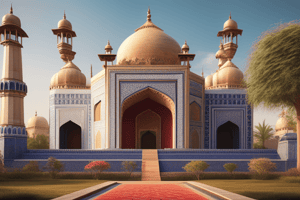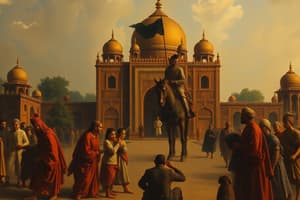Podcast
Questions and Answers
What initiative did the Bangladeshi government take to encourage foreign investment?
What initiative did the Bangladeshi government take to encourage foreign investment?
- Nationalized all industries
- Established export processing zones
- Increased tariffs on imports
- Entered into bilateral investment treaties (correct)
The World Bank primarily focused on agricultural projects in Bangladesh during the 1980s.
The World Bank primarily focused on agricultural projects in Bangladesh during the 1980s.
False (B)
What event marked the end of General Ershad's rule in Bangladesh?
What event marked the end of General Ershad's rule in Bangladesh?
1990 Mass Uprising
The Asian Development Bank was the __________ largest donor to Bangladesh during the 1980s.
The Asian Development Bank was the __________ largest donor to Bangladesh during the 1980s.
What educational reform was NOT implemented during Khaleda Zia's government?
What educational reform was NOT implemented during Khaleda Zia's government?
Match the following organizations or events with their roles in Bangladesh's development:
Match the following organizations or events with their roles in Bangladesh's development:
The 1991 elections in Bangladesh were widely regarded as fraudulent.
The 1991 elections in Bangladesh were widely regarded as fraudulent.
What specific aid project supported by the World Bank involved the maintenance of schools?
What specific aid project supported by the World Bank involved the maintenance of schools?
What was a key reason for the opposition parties' boycott of the February elections?
What was a key reason for the opposition parties' boycott of the February elections?
Food security depends solely on the availability of food.
Food security depends solely on the availability of food.
What does the term 'remittance' refer to?
What does the term 'remittance' refer to?
The total food grain production in Bangladesh increased from less than ___ million tons in the early 1970s to more than 27.0 million tons in 2005-06.
The total food grain production in Bangladesh increased from less than ___ million tons in the early 1970s to more than 27.0 million tons in 2005-06.
Match the following features with their descriptions:
Match the following features with their descriptions:
What contributed to the increase in remittances between 1996 and 2001?
What contributed to the increase in remittances between 1996 and 2001?
Bangladesh became self-sufficient in food grain production from 1999 to 2000.
Bangladesh became self-sufficient in food grain production from 1999 to 2000.
Identify a key feature of the strikes organized by opposition parties in 1995.
Identify a key feature of the strikes organized by opposition parties in 1995.
Which of the following actions did Jahangir take against forced conversions?
Which of the following actions did Jahangir take against forced conversions?
Jahangir suppressed Jains and executed Guru Arjan Dev during his reign.
Jahangir suppressed Jains and executed Guru Arjan Dev during his reign.
What province did the British gain control of as a result of the Battle at Palashi?
What province did the British gain control of as a result of the Battle at Palashi?
An export processing zone was officially established in __________ in 1980.
An export processing zone was officially established in __________ in 1980.
Which of the following public sector corporations was considered the most financially successful in the late 1980s?
Which of the following public sector corporations was considered the most financially successful in the late 1980s?
Enterprises in export processing zones enjoyed full exemptions from import and export duties.
Enterprises in export processing zones enjoyed full exemptions from import and export duties.
List two fields in which the public sector was limited to during the late 1980s in Bangladesh.
List two fields in which the public sector was limited to during the late 1980s in Bangladesh.
Match the following achievements or events with their corresponding details:
Match the following achievements or events with their corresponding details:
Flashcards
Bangladeshi investment treaties
Bangladeshi investment treaties
Bilateral agreements with other countries, ensuring things like currency transfers and compensation if assets are seized.
World Bank's 1980s role
World Bank's 1980s role
Promoting economic opportunities for women, job creation, and improvements in education, health, and population programs.
World Bank projects (examples)
World Bank projects (examples)
Projects like irrigation management, school maintenance, and fertilizer complex construction were supported to boost the economy.
Asian Development Bank's 1980s role
Asian Development Bank's 1980s role
Signup and view all the flashcards
Ershad's downfall cause
Ershad's downfall cause
Signup and view all the flashcards
1991 Bangladesh elections
1991 Bangladesh elections
Signup and view all the flashcards
Khaleda Zia's education reforms
Khaleda Zia's education reforms
Signup and view all the flashcards
Education reform impact
Education reform impact
Signup and view all the flashcards
Opposition's Protest Tactics
Opposition's Protest Tactics
Signup and view all the flashcards
Caretaker Government Purpose
Caretaker Government Purpose
Signup and view all the flashcards
Food Security Meaning
Food Security Meaning
Signup and view all the flashcards
Bangladesh's Food Grain Production
Bangladesh's Food Grain Production
Signup and view all the flashcards
Remittance Meaning
Remittance Meaning
Signup and view all the flashcards
Remittance Impact
Remittance Impact
Signup and view all the flashcards
Remittance Increase Factors
Remittance Increase Factors
Signup and view all the flashcards
1995 Strikes and Protests
1995 Strikes and Protests
Signup and view all the flashcards
Jahangir's Tolerance
Jahangir's Tolerance
Signup and view all the flashcards
Jahangir's Legacy
Jahangir's Legacy
Signup and view all the flashcards
British Control of Bengal
British Control of Bengal
Signup and view all the flashcards
Public Sector in Bangladesh (1980s)
Public Sector in Bangladesh (1980s)
Signup and view all the flashcards
Successful Public Sector Corporations (1980s)
Successful Public Sector Corporations (1980s)
Signup and view all the flashcards
Export Processing Zones (EPZs) in Bangladesh
Export Processing Zones (EPZs) in Bangladesh
Signup and view all the flashcards
EPZ Incentives for Enterprises
EPZ Incentives for Enterprises
Signup and view all the flashcards
EPZ Beginnings
EPZ Beginnings
Signup and view all the flashcards
Study Notes
Mughal Empire
- The Mughal Empire lasted over 200 years.
- At its peak, the empire encompassed modern-day India, Pakistan, and Afghanistan.
- Religious tolerance was important for Mughal emperors as most subjects were Hindu.
- Babur aimed to expand his territory, and after multiple attempts to conquer Samarkand, he turned to India.
- Babur defeated the Delhi Sultanate and Rajput Confederacy in the early 16th century.
- The First Battle of Panipat (1526) marked the end of the Delhi Sultanate and the beginning of the Mughal Empire.
- Babur fought four years to control northern India.
- Babur's battles were costly, and he died after four years due to natural causes, leaving the Mughal Empire with limited funds.
- The First Battle of Panipat was a turning point in Indian history as it initiated the Mughal Empire and introduced new military tactics.
- Military defeats, internal dissent, and the loss of the empire followed by its recovery were significant challenges faced by Humayun.
- Key contributions to Persian art and architecture during Humayun's reign included Humayun's Tomb, a UNESCO World Heritage site.
- Humayun's reign laid the groundwork for the expansion of his empire and the rule of Akbar the Great.
- Conflict arose between Humayun and Bahadur Shah due to the ambition of each to expand their territories.
- The Mansabdari System, a unique structure for military and civil governance, was established by Akbar.
- The system classified officials into ranks based on merit.
- Humayun was exiled due to defeats by Sher Shah Suri.
- Gujarat was conquered by Humayun.
- Afghans (Pathans) from Afghanistan/Pakistan regions played a significant role in Indian history, particularly during the Delhi Sultanate and Mughal periods.
- Humayun and Sher Shah Suri had three major encounters at Chunar, Chausa, and Kannauj.
- Humayun's weaknesses included generosity and leniency towards opponents.
- Major challenges for Humayun included military defeats and internal dissent. He faced significant setbacks against Sher Shah Suri.
- The Mughal court had internal strife and factionalism.
- Humayun faced challenges like political instability and dealing with revolts and rebellions.
- Humayun's relationship with his brothers was strained, complicating his rule.
- Akbar actively promoted religious harmony.
- Akbar established the Din-i-Ilahi, a syncretic religion, to foster unity.
- Jahangir ensured honesty among tax collectors to maintain government funds and fair judicial practices.
British Control of Bengal
- The Battle of Plassey gave the British control of Bengal, Bihar, and Orissa.
- Mughal Emperor bestowed administrative rights to the British after the Battle of Plassey.
- British rule in India was established.
Public Sector in Bangladesh (Late 1980s)
- Public sector roles were limited to seven areas including arms, electricity, and currency.
- Certain public corporations such as Bangladesh Petroleum Corporation, Bangladesh Chemical Industries Corp., and Bangladesh Forest Industries Development Corporation were financially successful.
- An export processing zone was created in Chittagong in 1980.
Incentives for Enterprises in Export Processing Zones
- Five-year tax holiday for pioneer industries.
- 50 percent income tax rebate for export sales.
Foreign Investment in Bangladesh
- Bilateral investment treaties were made with countries like the US and Europe.
- Unrestricted currency transfers and compensation for expropriation were assured.
World Bank and Asian Development Bank's Roles
- World Bank supported various projects like Irrigation programs, and the primary school maintenance.
- Asian Development Bank was the second-largest donor, supporting projects like livestock development.
1990s Bangladesh Political Events
- Opposition's demand for a caretaker government.
- General Ershad's rule was ended in 1990 due to the Mass Uprising.
- Anti-government protests.
- Strikes and protests by opposition parties led to caretaker administration for the elections.
- Boycott of the 1991 elections by some major opposition parties.
Education Reforms during Khaleda Zia's Government
- Free and compulsory education for primary students.
- Tuition-free education for girls up to 10 Class.
- Food for Education Program.
- Improved access to education for girls, increasing literacy rates.
Studying That Suits You
Use AI to generate personalized quizzes and flashcards to suit your learning preferences.




